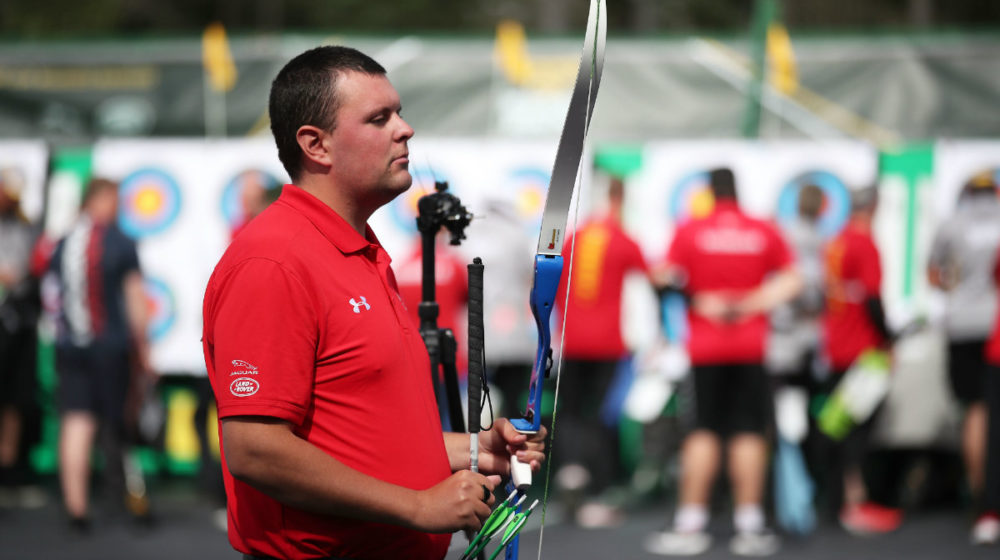Canadian archer Aaron Boulanger pulled off a personal best score in the qualifying rounds of his event on Thursday – shot three arrows straight and true although he couldn’t see where they landed.
The 28-year-old Navy sailor is now blind after a brain tumor robbed him of his sight.
“The tumor caused a build-up in spinal fluid and it damaged my optic nerve,” he said at the Sydney Olympic Park Hockey centre, where the targets have been assembled 18-metres out from the shooting line.
“I was just getting sick every morning so I wasn’t sure what was up.
“The fluid in my head was causing my illness and then I slowly started to lose my vision.
“I had just joined up (to Navy), was into my training after finishing my schooling. So just before I was able to really get into my career, I got sick.”
The secret to being able to fire off arrows is two-fold.
“Lots of practice – it takes a lot of practice,” Boulanger said.
The second part is having a partner standing right behind his ‘line of sight’ to give verbal guidance.
In the Winter Paralympics, biathletes use electronic rifles equipped with headsets to help the competitors locate the target through acoustic sounds. The signal intensifies the better the aim of the shooter.
Boulanger is not fussed at wearing headphones to hear a signal, or waiting for a siren to sound in the direction of the target.
“I don’ think it would help me. The ‘spotter’ behind me helps me a lot. He directs me left or right, up or down,” he said.
“After each arrow he gives me an assessment – hopefully his eyes are better than mine so he can tell whether I’m on target or not.
“If he says I’m good then I’m trusting him on that.”
It is a close partnership, somewhat like blind alpine skiers, cyclists or runners, use a sighted guide.
“Well he’s my dad so he knows me pretty well,” he said of father, Claude, who analyses each shot for his son so he can better prepare for the next arrow.
It is Boulanger’s first and last Invictus experience. Canada has a rule similar to Ukraine and other countries where competitors are rotated after one Games so as many wounded soldiers as possible get a turn.
“My dad wants to go next time now that he’s seen what the Games are like,” Boulanger said, grinning.
With 13 sports on he Sydney Invictus program, why archery?
“I just figured it would be a challenge and it would be fun to learn to do it with no vision. And just the reaction I get when I tell people I’ve entered in the archery for the Invictus Games,” Boulanger said.
“The one sport you probably need your sight most for, other than the driving event, is the one that interested me the most.”
The first competition to open the fourth Invictus Games last Saturday was the Jaguar Land Rover driving challenge on Cockatoo Island.
“They wouldn’t let me behind the wheel for some reason,” Boulanger said.
What happens next is his next hurdle, however.
“I’m still currently in the military but when I get home I will be medically released. I can’t stay in,” he said.
“And I have no idea what I’ll do next. I’ll figure that out once I get back and start looking for another job.”
Boulanger is the only vision-impaired service personnel on the 40-strong Canadian team.
Amputees and PTSD (post traumatic stress disorder) sufferers make up the bulk of the 500 Games competitors.
But he has message for not only vision-impaired military, but for every day civilians as well.
“Find something you can do and that you’re comfortable with and then go out there and have some fun with it.”
Margie McDonald
Invictus Games Sydney 2018
